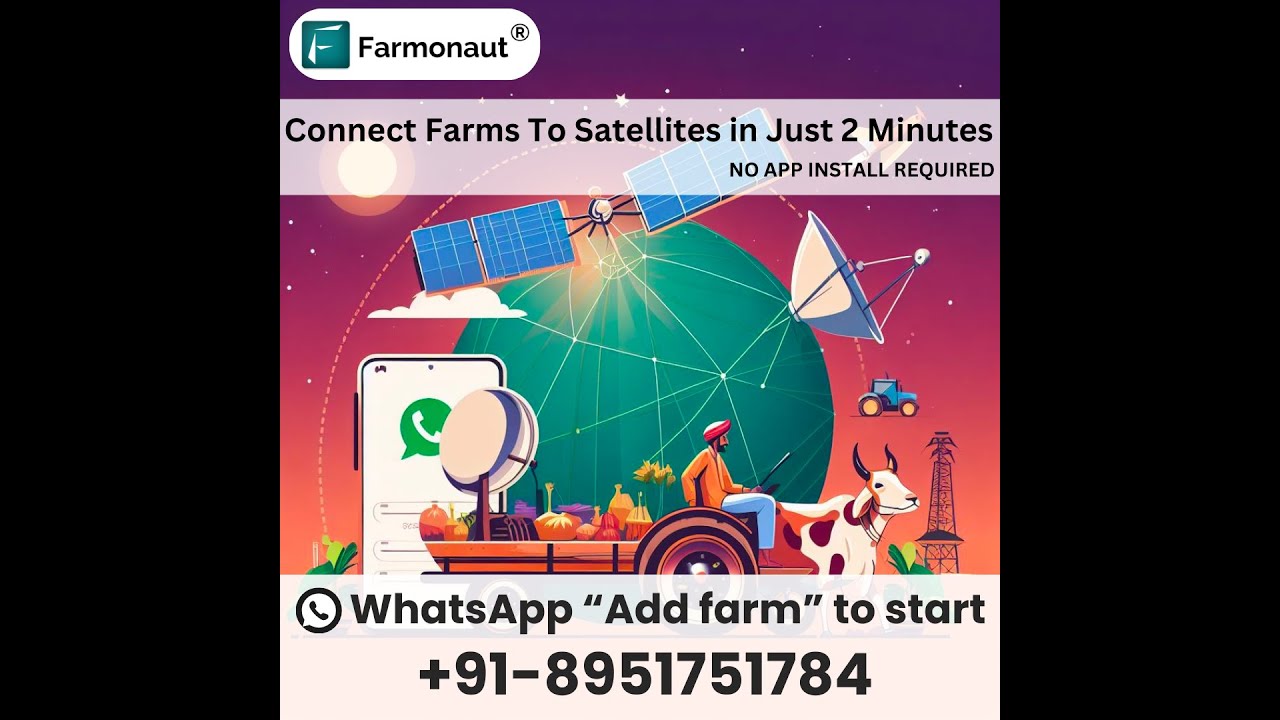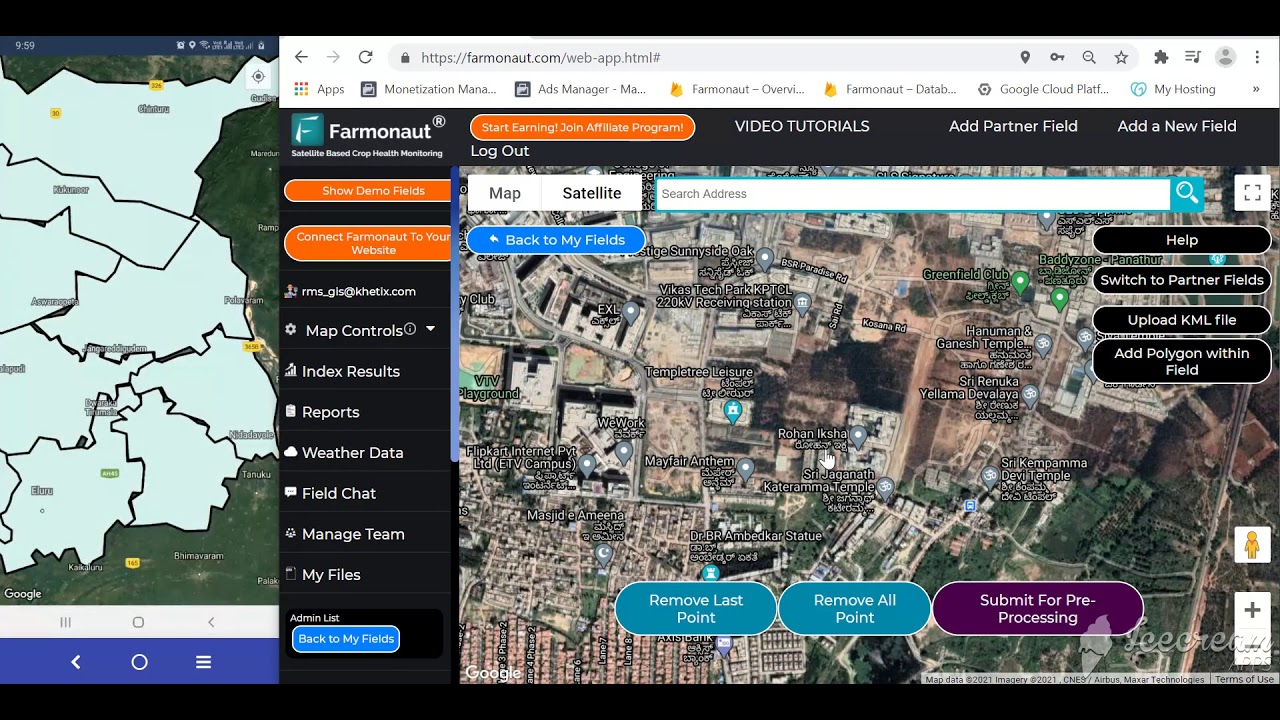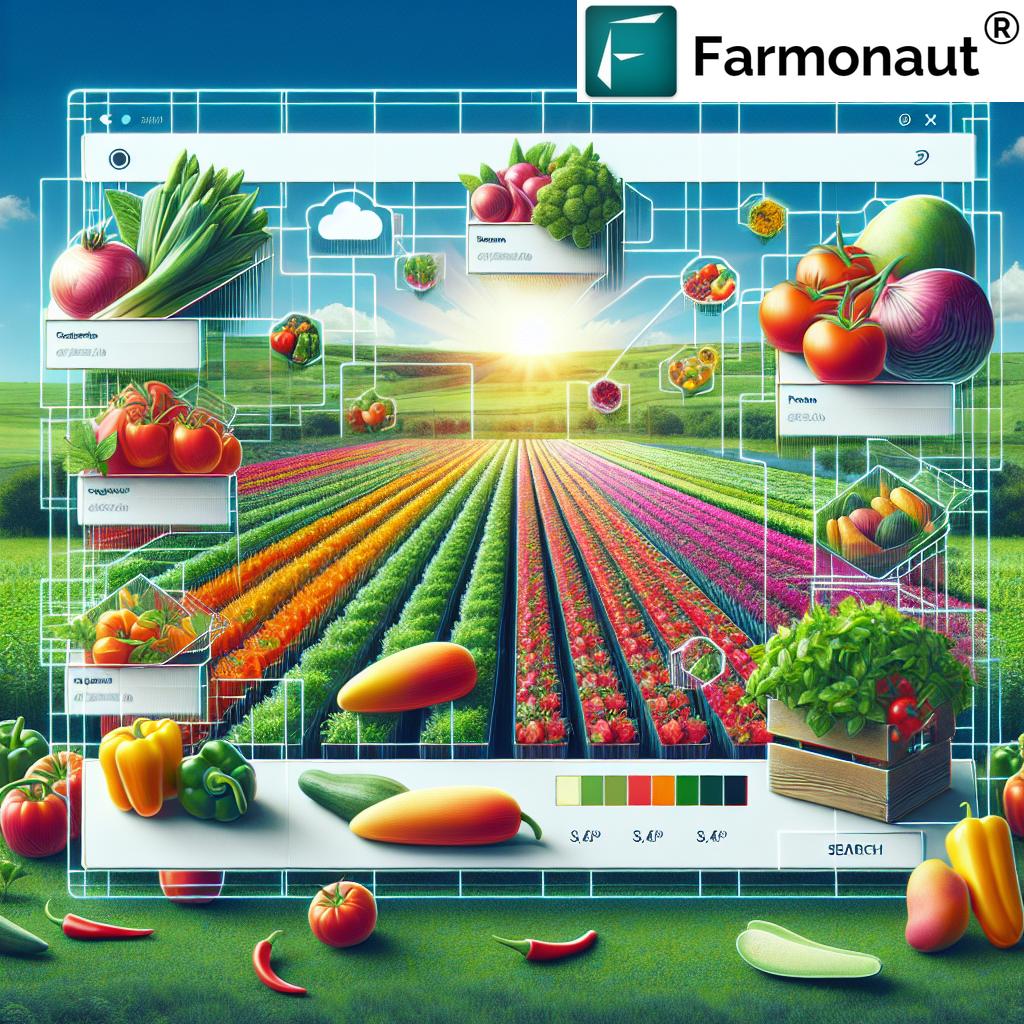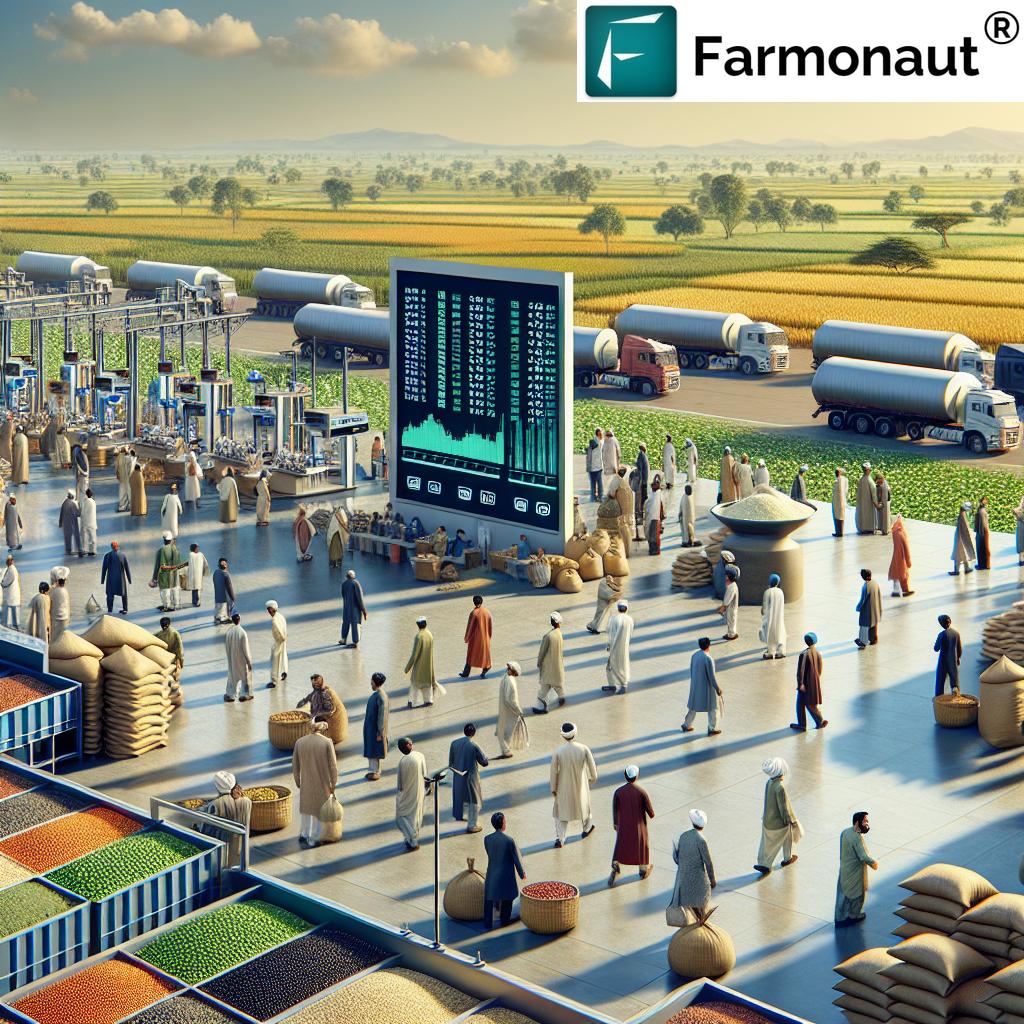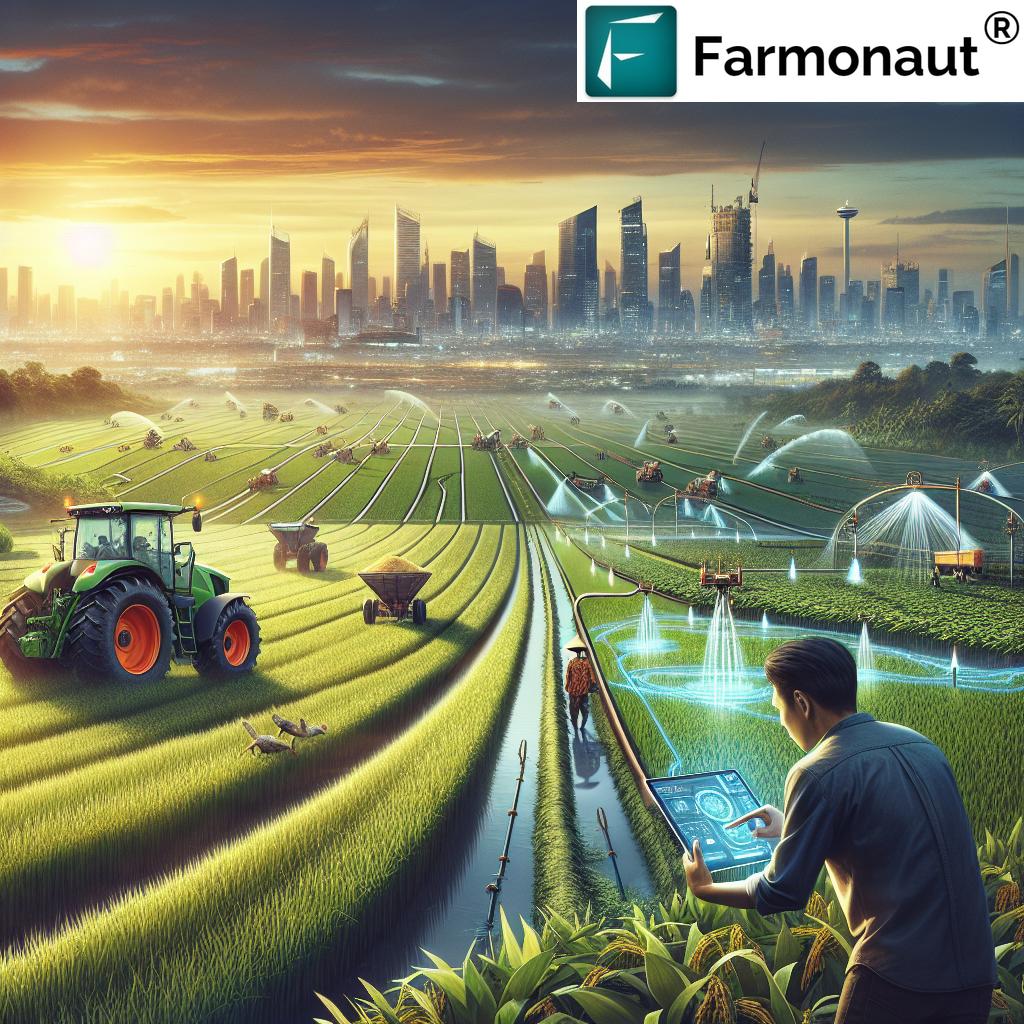Agricultural Drone Prices India 2025: Powerful Trends & Uses
“By 2025, agricultural drone prices in India are projected to drop by 30% compared to 2022 levels.”
Introduction: The Agricultural Drone Revolution in India
The agricultural drone revolution is transforming farming practices worldwide, rapidly reshaping modern agriculture with advanced technology. As we step into 2025, new trends, declining agricultural drone prices, and breakthrough features are making precision drones more accessible — especially in India, where agriculture forms the backbone of the economy.
India is one of the largest agricultural economies in the world, with millions of farmers depending on innovative tools to boost productivity, reduce costs, and ensure sustainability. Agricultural drone price and uses are thus vital topics for farmers, policymakers, and stakeholders aiming to harness digital solutions for the future of farming.
 Explore Field Monitoring & Planning on Farmonaut Web App
Explore Field Monitoring & Planning on Farmonaut Web App
In this in-depth blog, we’ll explore current and projected agricultural drone prices in India for 2025, dissect the most valuable uses for modern Indian farms, and break down how cutting-edge sensors, AI, battery life, and more are driving the industry forward. Whether you’re a smallholder farmer, an agribusiness, or a stakeholder in the agriculture sector, you’ll discover actionable insights to make informed drone investment decisions for the coming years.
Agricultural Drone Price 2025: Pricing, Trends & Expectations
Understanding agricultural drone price 2025 is crucial for farm budgeting and strategic planning. The market is experiencing a rapid evolution, with both global and Indian price trends signaling a more competitive and accessible ecosystem.
By 2025, the average agricultural drone price in India will range from INR 1.5 lakh to INR 12 lakh (approx. $2,000 – $15,000), depending on:
- Payload capacity: Heavier payloads allow for more efficient spraying/seeding over large areas, raising the price.
- Flight time and battery life: Longer operational time between charges vastly improves coverage and cost-efficiency.
- Sensor quality: Multi-spectral, thermal, and advanced imaging technology raise capabilities and value.
- AI and automation features: Precision controls, auto-routing, and digital integrations increase productivity but may affect pricing.
Globally, agricultural drone prices for comparable models typically span from $3,000 to $25,000, with entry-level models more affordable and suitable for small and medium-sized farms.
Key 2025 pricing trends:
- Local manufacturing and supply chains are growing, which is reducing costs and import fees.
- Government subsidies and incentives (like those under the Digital India and Mechanization Schemes) make drones more affordable and encourage mass adoption.
- More models and market competition drive innovation, with features like improved sensors, better battery life, and advanced AI.
- “Jump to the pricing table for a quick side-by-side comparison of top Indian agri-drones.”
What does this mean for you? As the agricultural drone market matures, Indian farmers and agribusinesses can expect steadily declining price points, inclusive financing options, and a wider range of drone models tailored to different crops, land sizes, and budgets.
How AI Drones Are Saving Farms & Millions in 2025 ? | Game-Changing AgriTech
Comparative Table: Agriculture Drone Price India 2025 & Features
Comparing agricultural drone prices and features side-by-side helps you match the right drone to your operational needs, whether you run a small farm or manage thousands of hectares.
| Drone Model | Estimated Price (INR, 2025) | Payload Capacity (kg/L) | Flight Time (mins) | Coverage per Hour (acres/ha) | Key Features | Typical Uses |
|---|---|---|---|---|---|---|
| DJI Agras T40 | ₹10–12 lakh | 40 kg (liquid/granule) | 45–50 | 22/8.9 | RTK GPS, Obstacle Avoidance, Multi-spectral Imaging, Large Payload, AI Auto-Planning | Spraying, Seeding, Mapping |
| Garuda Kisan Drone | ₹6–7 lakh | 10 kg | 25–30 | 8/3.2 | Automated Route, GPS, Real-time Imaging | Spraying, Monitoring |
| General Aeronautics GA-DK10 | ₹8–9 lakh | 10 L | 35–40 | 10/4 | AI Integrated, Soil & Crop Analysis, RTK | Mapping, Spraying, Health Assessment |
| IoTechworld Agribot | ₹4–5 lakh | 10 L | 25–28 | 7/2.8 | GPS Mapping, Real-Time Kinematic, Remote Control | Spraying, Surveillance |
| Krishi-Hawk X12 | ₹1.8–2.5 lakh | 2.5 kg | 18–20 | 2.5/1 | Basic Mapping, HD Camera, Manual Control | Small Farm Surveying, Crop Monitoring |
| Marut Agritech S90 | ₹5–6 lakh | 10 L | 30 | 7/2.8 | Terrain Sensing, Multi-crop Spraying, Real-time Data | Spraying, Multi-crop Farms |
This table showcases the versatility in agricultural drone price, features, and uses that are available in India in 2025. The range accommodates small, medium, and large farm operations, and price points are supported by government incentives and digital adoption programs.
Farmonaut | Connect Your Farms With Satellites in Just 2 Minutes Using WhatsApp
Key Agricultural Drone Uses in India’s Farms (2025)
“Over 50% of new Indian farms are expected to adopt drone technology for crop monitoring by 2025.”
Agricultural drones are revolutionizing how we approach farming in 2025. Equipped with advanced sensors, improved battery technology, and data-driven precision, today’s drones offer powerful benefits across a broad range of agricultural practices. Key agricultural drone uses include:
-
Crop Monitoring & Health Assessment:
- Multispectral and thermal imaging sensors precisely detect plant stress, nutrient deficiencies, and pest issues before they’re visible to the naked eye.
- Enables timely intervention, thus reducing nearly 30% of avoidable losses per season.
- Detection of irrigation needs helps optimize water use, lower costs, and boost yields.
-
Precision Spraying & Fertilizing:
- Drones with automated spraying systems ensure precise application of pesticides, fertilizers, and herbicides — lowering chemical use by up to 40% versus manual methods.
- Precision application also limits environmental runoff and supports sustainability on modern Indian farms.
-
Field Mapping & Soil Analysis:
- High-resolution aerial imaging and mapping help create accurate soil maps, identify low-lying areas, and analyze nutrient richness and topography.
- Critical for effective planting, irrigation planning, and optimizing inputs.
-
Planting & Seeding:
- Emerging drone models now perform aerial seeding operations, especially in hard-to-access areas like hilly farmlands and reforestation projects.
- Delivers consistent coverage while significantly reducing labor.
-
Yield Estimation & Harvest Planning:
- Analyzing crop maturity and growth via drone data allows farmers to predict yields, plan harvests, and optimize labor deployment.
- Reduces risk and waste, improving profitability.
-
Disaster & Weather Response:
- If used with satellite-based weather data and APIs, drones help monitor flood/drought-prone fields and support insurance claim verification.
The 2025 agricultural drone price in India is fast becoming “worth it” due to these multi-faceted uses and their impact on farm efficiency, yields, and overall profitability.
Farmonaut Large Scale Field Mapping & Satellite Based Farm Monitoring: Getting Started
Technology Trends: The Future of Drones, Sensors, and AI in Farming
2025 will see agricultural drone technology at the forefront of farm management transformation — not only in India, but globally.
- Advanced AI Integration: Smart artificial intelligence allows drones to auto-adjust spraying, monitor crop stages, and analyze data in real-time, boosting precision and reducing human error.
- Battery and Flight Time Improvements: Battery density enhancements mean most drones now easily exceed 25–50 minutes of continuous flight, covering vast swaths of acreage in a single charge.
- Enhanced Sensor Capabilities: New-generation drones carry multispectral, infrared, and hyperspectral sensors, offering actionable insights from plant health to accurate topography and soil mapping.
- Automation, Fleet, and Resource Management: Large operations demand drones that can be deployed in fleets, managed through centralized software, and capable of autonomous operation.
Check out Farmonaut’s Fleet Management tools that support remote oversight of all your agri-equipment, drones included! - IoT & Digital Transparency: Drones are increasingly integrated with IoT-connected sensors on-farm, providing a 360-degree view of operations, soil conditions, and machinery — all accessible on digital dashboards or through mobile apps.
- Blockchain for Traceability: As food safety and export regulations toughen, using tools like Farmonaut’s Blockchain Traceability Solutions secures and authenticates your crop’s journey from the field to the market.
- Environmental Monitoring: Drones are integral to real-time carbon footprint tracking. Monitor and report your farm’s carbon credit potential — a key requirement for modern green supply chains.
These technology trends are making agricultural drone prices in 2025 more accessible, driving mainstream adoption in Indian farming and global agribusiness.
Saskatchewan Runway Upgrade 2025 – Rural Aviation, Ag-Spraying & Precision Farming
Indian Government Push, Subsidies, and Digital Initiatives
The Indian government’s role in the mass adoption of agricultural drones cannot be overstated. Multiple policy measures and digital initiatives are making agricultural drone prices even more attractive in 2025, including:
-
Promotion of Agricultural Mechanization Scheme:
- Subsidies of up to 40–50% on drone purchases for eligible farmers, FPOs, and cooperatives.
- INR 6,000+ crore allocated for farm infra and machinery upgrades, including drones.
-
Digital India Initiative & Incentives:
- Support for indigenous manufacturing, reducing costs and making drones locally available.
- Fast-tracked drone licensing, pilot training, and operational compliance easing market entry.
- Integration of digital farm data via government APIs directly tied to crop insurance, planning, and disaster management.
-
Custom Hiring Centres (CHCs):
- Access to drones on a pay-per-use basis, lowering upfront investment.
These governmental pushes increase the adoption of agricultural technology by reducing prices and improving accessibility, especially for small and marginal farmers in India.
Satellite-Based & Data-Driven Farm Management (Farmonaut Overview)
Farmonaut is a satellite technology company at the cutting edge of agricultural digital transformation in India and beyond. While we do not manufacture or sell drones, we enable drone and sensor data to be combined with real-time satellite insights, empowering farmers and businesses with advanced tools for modern agriculture.
-
Satellite-Based Monitoring:
- Get multispectral satellite images to monitor crop health, field conditions, and operational threats in near-real time.
- Combined with drone-collected data, users enjoy deeper efficiency, performance, and sustainability insights.
-
AI-Powered Advisory (Jeevn):
- Real-time AI agricultural advisory for weather, pest, and disease forecasting, personalized to your farm and crops.
-
Blockchain for Traceability:
- Secure, verifiable farm-to-fork traceability solutions, supporting food export readiness, quality certifications, and premium supply chains.
-
Carbon Footprinting & Sustainability Tracking:
- Monitor your carbon emissions and credits using real geospatial data, aligning operations with environmental compliance.
-
Crop Loan & Insurance:
- Satellite-driven field verification provides faster loan approval and factual insurance claim processing.
-
API Access for Developers:
- Want to build custom solutions? Use the Farmonaut API (see developer docs) for access to satellite, weather, soil, and vegetation data.
Farmonaut’s Agro-Admin App is ideal for large scale farm management and resource planning backed by real-time satellite monitoring.
Farmonaut: Cultivating Innovation in Agriculture | Year in Review 2023
How to Choose the Best Drone for Your Farm: Practical Considerations
Investing in agricultural drones should begin with your core operational priorities:
-
Land Size & Crop Type:
- Small farms (under 5 acres) can benefit from entry-level mapping/spraying drones (priced between INR 1.5 – 3 lakh).
- Larger farms (>25 acres) may require heavy-duty drones (INR 7–12 lakh) with higher payload capacity, longer flight time, and advanced sensors.
-
Key Functions Needed:
- Spraying, mapping, monitoring, seeding, or multi-purpose? Choose sensors and payload accordingly.
-
Budget & Financing:
- Explore government subsidies, hire-purchase, or custom hiring solutions to manage upfront costs.
-
Regulatory Compliance:
- Ensure your drone is DGCA approved (for India) and operator is adequately trained/licensed.
-
Integration with Digital Platforms:
- Consider how drone data will connect with satellite monitoring, weather APIs, and digital dashboards for holistic farm management.
When selecting a drone in 2025, always seek transparency on actual operational range, battery replacement costs, and software update policies to futureproof your investment.
2025 Veg Equipment Boom – Smart Farming, AI Telematics & Agri Market Trends
Improving Productivity & Sustainability: Environmental Impact, Traceability, and Carbon Footprinting
The dual challenge for Indian agriculture in 2025 is to maximize yields while ensuring environmental sustainability. Agricultural drones, when combined with digital tools and satellite intelligence, radically improve both:
- Reduced Chemical and Water Usage: Drones perform targeted spraying, minimizing overspray and runoff. This drives substantial cost savings and lowers the burden on local water resources and the environment.
- Better Record-Keeping & Transparency: Drones create verifiable digital logs, supporting compliance, insurance, and traceability – laying the foundation for premium export-grade produce.
- Environmental Impact Monitoring: Use satellite-backed carbon footprinting tools from Farmonaut to track your farm’s climate impact, identify improvement zones, and potentially qualify for green finance initiatives.
- Traceability: With the rise of health-conscious consumers, traceability solutions ensure every crop batch is tracked from field to fork, preventing fraud and food recalls.
Farmonaut Web App – Farm & Satellite Data Monitoring Demo
Farmonaut Subscriptions: Affordable Satellite & Agricultural Data Insights
To support the agricultural sector’s digital transformation, we offer flexible subscription plans tailored to your monitoring and data needs. Explore plans and pricing below:
FAQ: Agricultural Drones in India, 2025 & Beyond
What is the average agricultural drone price in India for 2025?
The average agricultural drone price in India for 2025 ranges from INR 1.5 lakh to INR 12 lakh (approx. $2,000–$15,000), depending on model, payload capacity, range, battery life, and features such as AI guidance, precision spraying, and mapping.
Which factors influence agriculture drone price India 2025?
Key factors: payload capacity, flight time, range, sensor sophistication (multi-spectral/thermal imaging), automation features (AI, GPS, RTK), manufacturer, battery quality, and after-sales support.
What are the main uses of agricultural drones in India?
Agricultural drone uses in India include crop monitoring, health assessment, spraying and fertilizing, mapping, soil analysis, planting/seeding, disaster assessment, and yield prediction.
Are there government subsidies for agricultural drones in India (2025)?
Yes. Central and state government have announced subsidies covering 40–50% of drone purchase prices for select farmer groups, cooperatives, and custom hiring centres. Specific eligibility varies by scheme and location.
Do drones work for small farms, or are they mainly for large farms?
There are entry-level drones with basic aerial surveying, mapping, and targeted spraying functions that are suitable and affordable for small and marginal Indian farmers—especially with subsidies or pay-per-use hiring options.
Can drone data be integrated with satellite monitoring or farm management software?
Absolutely. Many modern agricultural drones output geo-tagged data compatible with satellite-based solutions and digital platforms. For example, Farmonaut’s APIs and digital dashboards can overlay drone and satellite insights for holistic field management.
Is drone use in Indian agriculture regulated?
Yes. The DGCA (Directorate General of Civil Aviation) sets rules regarding drone size, purpose, altitude, and required operator training. Always ensure compliance before commercial deployment and spraying.
Where can I access satellite-powered farm monitoring to complement drone operations?
You can leverage the Farmonaut web and mobile apps for real-time satellite imagery, AI advisories, weather updates, and digital field mapping.
Conclusion: Investing in the Future of Indian Agriculture
In 2025, agricultural drone prices in India have become significantly more affordable, competitive, and accessible — powered by technology evolution, government support, and mass-market adoption. Agricultural drone technology now sits at the frontline of modern farming: offering precision, efficiency, reduced costs, improved yields, and environmental sustainability.
By blending aerial drone data with satellite monitoring, AI-powered advisory, resource management, and digital traceability platforms, Indian farmers and agribusinesses can futureproof their operations and thrive in an increasingly data-driven economy.
*Remember: Choosing the right drone for your farm in 2025 means understanding not just the initial price, but also its specifications, operational suitability, and integration with digital infrastructure. Leverage government incentives, explore subscription-based farm management solutions, and consult digital tools to maximize your returns.
Stay at the forefront of Indian agriculture’s digital transformation — harness the power of agricultural drones and satellite-driven insights for a sustainable, profitable future.
Access Farmonaut’s Web & Mobile Platforms — See Your Field from the Sky!



